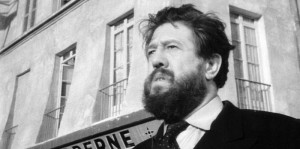The 13th annual Salve Regina French Film Festival take place from Sunday, Febrary 25, through Thursday, March 8. There are a total of six films, said French professor Dean de la Motte, the festival coordinator, all open to the public.
“We’re always trying to involve both the [broader] community and the university community and encourage different groups to attend, so it’s sort of a cross-section of students, faculty, and Francophiles and cinephiles in Newport,” de la Motte said. “It’s part of our cultural outreach of the university but also helping to promote French culture and French cinema in the United States, which is one of the reasons we receive … a small grant from French cultural services called the Tournées grant.”
“At this point it’s rare to find any of these on Netflix, there might be one or two that you could find occasionally, but we don’t want things that people can just find really easily, obviously,” de la Motte said. “We don’t organize necessarily thematically. What we like to do is have a broad range, and the Tournées festival requires us to choose five contemporary films and one classic, so that’s the framework. Then we have a menu of films that we choose from. It’s not any French-language film in the world — it’s the ones that are sponsored by the Tournées grant process. They tend to be serious films artistically and deal with serious topics, and some of them push the envelope a little bit. We’re not getting a lot of mass-marketed French comedies or that sort of thing.” The menu of selections this year was 21 contemporary films from 2014-2016 and six classic films, and selections are made by a volunteer committee drawn from faculty and students. The Alliance Française of Newport also donates, de la Motte told us.

“The opening film, Panique (“Panic”), is a film-noir that was sort of rediscovered recently and is very hard to find in this country, so that’s an interesting thing for the history of French cinema. It’s a postwar film,” de la Motte said. Although a total failure both critically and commercially at the time, the 1947 film is now almost universally regarded as the definitive masterpiece of director Julien Duvivier, based on the 1933 novel Les Fiançailles de M. Hire (“The Engagements of M. Hire”) by Georges Simenon (a prolific author primarily remembered for his hundred or so mystery novels and short stories featuring the memorable Police Commissioner Jules Maigret). Panique is about a lonely and eccentric Jewish tailor – M. Hire was originally M. Hirovitch – who becomes embroiled in a complex web of criminal intrigue as he observes the woman in the next building who never closes her blinds. Duvivier, who took refuge in Hollywood during the Nazi-Vichy occupation of France, clearly intended Panique as a parable about the psychological mechanisms of enemy collaboration.
Focusing on a Moroccan-born single mother raising two daughters, the younger of high school age and the older studying for medical school, Fatima, directed by Philippe Faucon, is a drama inspired by a semi-autobiographical writer who gave her own name to her main character in Prière à la lune (“Prayer to the moon”) and Enfin, je peux marcher seule (“Finally, I can walk alone”) by Fatima el-Ayoubi, works quoted in the guise of letters to her daughters. The film dominated the 2016 César Awards, the French version of the Oscars, winning Best Film, Most Promising Actress and Best Adaptation. Soria Zeroual was nominated for, but did not win, the Best Actress César for the title role as an immigrant housecleaner and was, in fact, working as a housecleaner and had no acting experience before being cast. “It deals with immigration and people of Arab descent, in particular racism and illiteracy and generational conflict,” de la Motte said.
L’Avenir (“The Future” or “Things to Come”), written and directed by Mia Hansen-Love, features major French film star Isabelle Huppert as a middle-aged high school teacher trying to maintain a positive outlook and sense of purpose while her life is falling apart around her: her husband leaves, her mother dies, and the publishing house where she works as an editor is going out of business – conjuring thoughts of a female version of the Book of Job.
Louise en hiver (“Louise in Winter” or “Louise by the Shore”) is an animated film for an adult audience in which elderly widow Louise becomes trapped in a deserted summer resort by missing the last train, and holes up with her talking dog and memories of her childhood in a hut on the beach.
Voir du pays (“Viewing the Country” or “The Stopover”) is about French soldiers returning from deployment in Afghanistan, taking a rest and recuperation stay in a high-end hotel in Cyprus as they participate in group therapy sessions, especially focusing on sexism experienced by female soldiers at the hands of their comrades.
Eastern Boys is about a middle-aged gay professional man who finds an illegal alien teenager from war-torn Chechnya in a train station and invites him to his home, making himself a target of a home invasion by a gang. The two continue to see each other as the initially sexual arrangement takes on the character of a father-son relationship.
All screenings are on campus at the Bazarsky Lecture Hall in the O’Hare Academic Building, Salve Regina University, 100 Ochre Point Ave, Newport. salve.edu/french-film-festival To avoid lines at the door, patrons are encouraged to buy a festival pass online. For questions, call (401) 341-2197 or email frenchfilmfestival@salve.edu